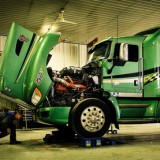Evolution of Highway Truck Stops
Highway truck stops have come a long way since their debut in the 1940s. When they were first implemented, they were simply a place for trucks to refill their gas tanks before heading back onto the road. The trucking industry has experienced tremendous growth since the 1940s. The changing needs of the trucking industry are reflected in the 21st century truck stop. In comparison to these original stops, today’s truck stop is highly evolved. Some even include special features and luxury amenities that rival a spa or resort. Trucking Industry Growth Upon examining the incredible growth of the trucking industry in the past decades, the specialized nature of today’s truck stops comes as no surprise. According to the American Trucking Association (ATA), trucks transport roughly 70 percent of all freight in the United States each year. Trucks are the sole delivery source for more than 80 percent of America’s communities. The success of the trucking industry means that there are many trucks delivering many goods around the country, and that means there are many truckers who are spending most of their lives on the road. Special Amenities A wide selection of food is one of the staples of today’s truck stop. Patrons can often choose from several types of food, from snacks to full meals. A number of truck stops also feature brand-name restaurants. Today’s truck stop may also feature amenities like showers, Internet kiosks, and wireless access. Truck stops are evolving away from the quick stop-and-go image they were built on. Instead, these facilities are encouraging drivers to enjoy a home away from home. Some truck stops even feature special activities and amenities, such as: Rooms for overnight stay Gyms and fitness classes Jacuzzis Hair salons and spas Movie theaters Bowling alleys Health checkups Chiropractic services Servicing the Public When truck stops were originally developed, they were solely intended to service truck drivers. However, with the evolution of the truck stop has come an evolution in the type of patrons who come and go. More and more of the general traveling public have begun to frequent truck stops to take advantage of the broad food selections and special amenities. In order to support the image of being open to the public, many truck stops have been coined as “travel plazas” or “travel centers.” Truck stops have also begun to boast “family friendly” features to encourage families to take a break during road trips and other...
read moreSummer Trucking Preparations
While it is common knowledge that trucks must be prepared for cold weather and poor conditions, it is equally important that trucks be prepared for the heat of summer. High temperatures can put strain on the mechanical components, and hot asphalt can increase the risks of blowouts and tire damage. To prevent mechanical failures and costly repairs, it is important to properly prepare trucks prior to summer usage. Summer Trucking Maintenance Preparations To ensure that the tires are safe for use in hot conditions, the tire pressure should be checked when temperatures begin to rise, and on a regular basis throughout the summer. Tires typically lose about one psi per month, but may lose more when temperatures shift dramatically. Underinflated tires have a higher chance of catastrophic blowouts, especially if the outside temperature exceeds 90 degrees. Underinflated and overinflated tires also decrease fuel efficiency and wear out faster. Mechanical Systems Prior to operating a truck during the summer, it is important that all fluids be topped off and all systems receive proper maintenance. Belts should be checked and replaced as needed, and any recommended maintenance based on mileage should be completed. Air conditioning should be inspected prior to the season to ensure functionality, as a failed air conditioning unit can pose health risks for the driver. Refrigerated Trucks High temperatures put additional strain on refrigeration units, so it is imperative to test cooled compartments regularly and perform maintenance as needed. Refrigeration failures during the heat of summer can be costly for trucking companies, both in terms of repairs and damaged shipments. Refrigeration failures can also impact customer relations when deliveries fail to be delivered on time and in good condition. Summer Trucking Cleaning Preparations Removing leftover residues from winter sand and salt can help to improve the efficiency of vehicles and prevent costly corrosion repairs down the road. When cleaning trucks in preparation for the summer, it is important to ensure that hidden places on the truck are cleaned as well as the outside. The radiator, undercarriage, and other hard to reach areas may harbor sand and chemical build-ups that can damage systems. Driver Summer Preparations Truck drivers should also be sure to properly prepare for summer by staying hydrated and taking precautions. Drivers that are exposed to the sun for long periods of time when making deliveries should wear protective clothing and sunscreen. Drivers should also be sure to rest in cooled areas when necessary to prevent against heat stroke. Truck drivers that are operating while overheated or dehydrated not only put themselves and the delivery in danger, but also pose a risk to other drivers. Sources: http://www.consumerreports.org/cro/news/2012/08/tips-to-keep-your-car-tires-cool-amid-damaging-summer-heat/index.htm http://www.dmvflorida.org/tires-heat.shtml...
read more















